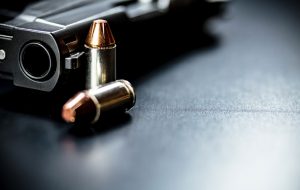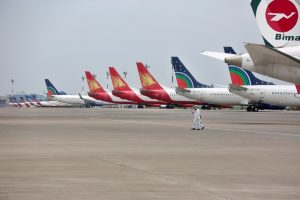The mounting sufferings of the people in the absence of transports along with tensions over safety following the counter political programmes of the two major political parties leading to clashes have further compounded the situation and uncertainties.People had to face severe hardship to go in and out of the capital as there were no transports inside the city or long distance buses on the district routes. Even there was no movement of trucks transporting essentials.
Patients and garments workers suffered the worst due to the absence of transports and overcharging of the ambulances.
The capital was virtually cut off from the rest of the country as its entry points including Aminbazar, Tongi, Jatrabari, Babubazar, Demra, Postagola were under control of law enforcing agencies and ruling party supporters carrying clubs, who checked on everything moving on foot or rolling out on wheels.
The absence of different modes of transports in and outside the capital forced on by the ruling party activists put the city dwellers to suffer immensely throughout the day.
The non-availability of transport left office goers, students, patients, women and children in the lurch at different bus stops in the city. The situation was pathetic particularly at Mirpur-1, Mirpur-10, Shahbagh, Farmgate, Mohakhali, Gabtali, Sayedabad, Jatrabari, Gulistan, New Market, Banani, Gulshan, Uttara, Motijheel, Kamalapur, Press Club, Paltan, Mohammadpur and Dhanmondi.
Cashing on the plight of the people, rickshaw pullers and auto-rickshaw drivers made a windfall by charging exorbitant fares even for short journeys.
The movement of the transports was remained suspended because of the government instructions to prevent opposition’s much-hyped ‘March for Democracy’ programme.
Rickshaws, human-haulers, CNG-run auto-rickshaws and battery-run three-wheelers were dominating the city streets.
Some people were also seen going to their destinations on rickshaws, and vans while many others on foot.
Police put on barricade at six points from Gabtali to Aminbazar, the eastern entry point of the capital.
Huge number police, members of RAB and BGB personnel were being deployed in the area.
No commuters including serious patients were able to enter the capital without police search even those who were coming on foot.
Police and RAB personnel searched each and every vehicle including private cars, ambulances and rickshaws in six points.
If anybody failed to show their identity card to the law enforcers, they are barred to enter the capital.
Police didn’t allow many people to enter the capital and sent back them from Gabtali areas.
Mainul Islam, president (north) of Awami League held a rally at Mazar Road point.
Many activists of AL, Juba League and Chhatra League guarded the areas with different kinds of sticks in their hands to resist BNP marchers.
No passenger buses moved in and out of Gabtali bus terminal.
“I will go to Farmgate to my daughter’s house. My daughter is serious and suffering from cancer. Since there is no vehicle on the road, I started my journey on foot from Hemayetpur just after hearing the news,” Mubarak Hossain, 65, told this Correspondent at Gabtali point.
A group of 14 day-labourers were seen walking from Kanchpur bridge to Jatrabari as they were forced to leave their hired vehicle at the eastern gateway of Dhaka on Sunday afternoon.
The day-labourers, who had gone to Sonaimuri in Noakhali for agricultural works, were returning to their homes in the northern part of the country as they had no jobs.
They had worked only for three days and earned Tk 750 each and apprehended that they would have to reach their destination with empty hand.
“We started our journey on Saturday night from Sonaimuri and have already spent Tk 350 per head. Now we have no sufficient money to take our meals and to Pirganj in Rangpur,” Lovely Miah, 38 told The Independent near signboard area in Dhaka.
He said they were not aware about March to Dhaka for Democracy and the state of situation in and around the city.
Chan Miah, 60, also said that neither they have enough money to hire costlier transport nor take food. “We did not take any food since Saturday evening as we have no enough money,” he added.
Abdul Quader, 60, a cancer patient had to face sufferings on way to his village home at Muradnagar Comilla as there were no transport for Saturday.
After receiving chemotherapy from Delta Hospital at Mirpur he started his journey by rickshaw and reached Farmgate at a cost of Tk 100. Quader accompanied by his nephew reached Jatrabari at 11:30am hiring a CNG-run auto rickshaw at a cost of Tk 100.
“Now, I don’t understand as to how I will reach Muradnagar since there is no transport centering the opposition programme,” he said.
Habibur Rahman, a father of school boy, said, “A two-way bus ride from our home at Mohammadpur to my son’s school at Dhanmondi only costs Tk. 20. But today, I was forced to pay Tk. 100 to a rickshaw to drop me and my son to his school.”
“We wanted to visit my ailing mother at Dhaka Medical College Hospital. We’ve been waiting for a bus for three hours now. The few rickshaws here are demanding 10 times the normal fare,” said Meherunnesa, waiting at Mirpur-1 bus stand.
At the Hazrat Shahjalal International Airport, the passengers suffered a lot as the number of vehicles were fewer and the drivers of private vehicles were demanding high fare.
Abdus Salam, 40, returned from India, said, “I want to go to Dhanmondi but the CNG run auto rickshaw is asking Tk 400 to Tk 500 fare which was about Tk 300 earlier.” – Staff Reporter




